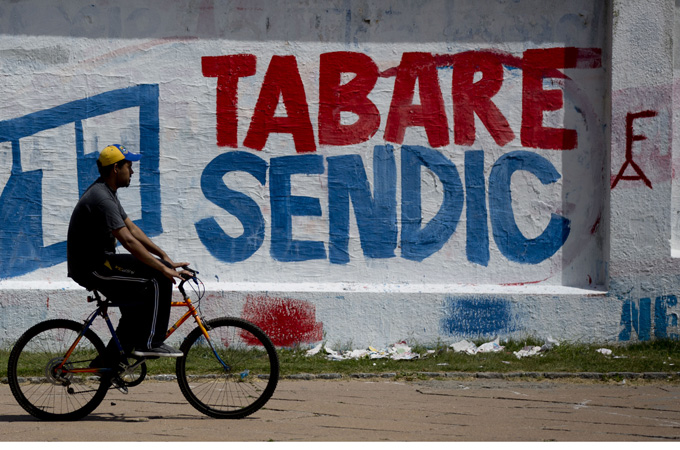Uruguay set to elect new president
Liberal programmes such as social security and marijuana production will be tested at Sunday’s election.

Montevideo, Uruguay – Five weeks after the country’s elections resulted in a run-off, Uruguayans return to the polls Sunday to choose either a former president or the son of a former president as the nation’s next leader.
The first election on October 26 saw Tabaré Vázquez, a former president (2005-2010) and the leftist Frente Amplio (Broad Front) candidate, securing 47.8 percent of the vote but failing to secure the majority necessary to avoid a second round.
Keep reading
list of 4 items‘Absolute power’: After pro-China Maldives leader’s big win, what’s next?
Solomon Islands pro-China PM Manasseh Sogavare fails to secure majority
Pro-China party on course for landslide victory in Maldives election
Luis Lacalle Pou, the right-wing Partido Nacional (National Party) candidate, and son of former president Luis Lacalle (1990-1995), received 30.9 percent of the vote. Voting is compulsory in Uruguay.
Lacalle Pou, 42, has claimed his party represents Uruguay’s youth; at one point during his campaign, he performed gymnastics for photographers, and challenged Vázquez, 74, to do the same. However, Vazquez’s Frente Amplio’s party won the pivotal youth vote in every state, an important demographic that includes 250,000 new voters in this election – 10 percent of the total voters – who had reached voting age since the previous presidential election.
 |
| A man rides a bike in front of a wall painted with campaign propaganda promoting the ruling Broad Front party [AP] |
Gaining the youth vote was also surprising for a party whose current president, José Mujica, is 79.
Liberal agenda
Mujica’s tenure encompassed the creation of a yet-to-be-implemented state-run marijuana industry, as well as the legalisation of abortion and same-sex marriage.
Known affectionately as “Pepe”, Mujica is internationally renowned for his progressive social policies, donating 90 percent of his salary to charity, and remaining in his small farmhouse rather than moving into the presidential residence.
A former guerrilla Marxist who spent more than a decade in solitary confinement, his gentle, informal mien has begotten affection and support from many Uruguayans.
Presidents in Uruguay are constitutionally limited to non-consecutive five-year terms, and Mujica is barred from seeking a second term. However, he was elected a senator in the October elections, and will remain a powerful voice in the government.
José Bayardi, the minister of labour and social security and former minister of defence in Vázquez’ first term, told Al Jazeera if Vázquez is elected, there won’t be any upsets to Mujica’s programmes.
“I think that the overall programme that the Frente Amplio has developed in terms of economic policy, social policy, and the development of the country isn’t going to suffer any big changes. You might see a different style in moving these policies forward, but there won’t be big changes,” Bayardi said.
RELATED: Old versus the new in tight Uruguay election
Although Vázquez does not support abortion, it will remain legal. “[Vázquez] has always been against abortion, even as far back as 1994. When it was approved by the government [in 2012] he signed a petition for a referendum against abortion, but less than 10 percent of the population wanted a referendum, so now he considers the topic closed,” said Bayardi.
A win for the Partido Nacional would mean a significant departure from the Frente Amplio’s policies but, even with the support of the Colorado Party, who endorsed him after their candidate was eliminated, Lacalle Pou’s chances look slim.
Polls have found that Vázquez is expected to take 52 percent of the vote and Lacalle Pou 37 percent. Economic success, no doubt, has much to do with this: unemployment was 6.3 percent in 2013, an historic low, and economic expansion reduced poverty from 39.9 percent in 2004 to 11.5 percent in 2013, all on Frente Amplio’s watch.
Personal development
Lacalle Pou’s platform, pitting itself against what it calls a culture of handouts, emphasises self-reliance.
“The government has to have a very active role in, first of all, satisfying the individual´s basic needs, but after that, it needs to give the person the instruments with which he or she can live by his or her own means and achieve personal development,” Azucena Arbeleche, economic adviser for the Partido Nacional and candidate for minister of finance should Lacalle Pou win, told Al Jazeera.
“We understand that the party in government has made some progress on the first point – even though in a population of 3.3 million people, we still have one million with at least one basic need unsatisfied – but it has definitely not succeeded in the second.”
The Partido Nacional has outlined several proposals for changing social services. One is a plan called “Estamos Contigo” – “we are with you” – to help support low-income working families through a system of increased monetary help from the government, job training, and an income tax exemption. Critics have said the programme is a ploy to make Lacalle Pou, often accused of elitism, appear to be more in touch with the working class.
Education, a much-debated topic in this election, is also a part of the Partido Nacional platform.
“The budget for education needs to be increased, but the basic focus for us is not the amount of resources, which have significantly increased during the last five years, but the efficiency in which these resources are allocated,” Arbeleche said. “We need better results, not just more money in the education budget.”
The party is proposing to increase the number of schools, offering support for children with learning difficulties, and to extend the teaching of English language to all primary schools.
Lacalle Pou has stated if he wins the presidency, he will send a bill to parliament to repeal the legislation mandating state-regulated production of marijuana, though it would remain decriminalised. Even if he defies the odds and wins the election, he would still face a Frente Amplio’s majority in parliament, making passing any legislation difficult.